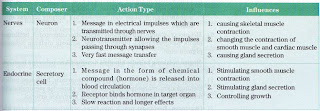Human Endocrine System
Selasa, 02 April 2013
1 Komentar
Endocrine system is the system which consist of gland and tissues producing hormone. Hormone is the chemical substance produced by one part of a body which influence gland or other tissues’s activities, such as cell metabolism, reproducing, growth and development, behavior, and homeostatic.
Endocrine glands have no tract (dead end gland) which secretes hormone directly into the blood to be distributed throughout the body.
Exocrine gland have tract; secreted substance is put into and distributed through the tract. One of exocrine glands is saliva gland which secretes saliva which is distributed to mouth through saliva tract.
Classiffication Of hormone
There are two groups of hormone, peptide hormone (consist of peptide hormone, protein hormone, glycoprotein hormone, and amino acid modification hormone) and the steroid hormone.
THE FUNCTION OF ENDOCRINE GLANDS AND HORMONE PRODUCED
The association between endocrine system and nervous system in the form of cooperative work is meant to maintain internal environment homeostasis, such as several hormones are involved in maintaining the level of calcium and sodium in the body.
The following table shows the
THE COMPARISON BETWEEN NERVOUS SYSTEM AND ENDOCRINE SYSTEM




Priliximab Anti-Human CD4 Therapeutic Antibody (Priliximab) is available from creative biolabs.
BalasHapus